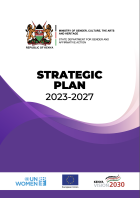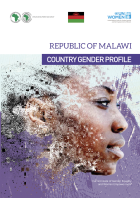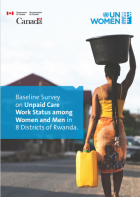1 - 10 of 10 Results
Date:
The Publication is a detailed strategic plan for the period 2023-2-27. It highlights previous achievements, lessons and emerging issues that define the policy direction of the gender sector achieving a society free from gender discrimination and violence
Date:
The Malawi Counrty Gender Profile publication presents a review of existing gender issues identified through a review of documents and reports recently released. The generic purpose of Country Gender Profile is to strengthen national understanding and data on the advancement of international, regional and national commitments towards Gender Equality and Women's Empowerment.
Date:
Devolution has increased opportunities for women and other marginalized groups to participate and engage in county-level planning, budgeting, and implementation, and ensured an opportunity for county governments to integrate gender-responsive mechanisms in these same processes. The report synthesizes the impact on women and girls in devolved sectors of local government including education, health, agriculture, water and sanitation, and urban planning across the 14 counties of the United Nations Joint Devolution Programme.
Date:
The baseline survey on unpaid care work status among women and men in eight districts of Rwanda seeks to understand the care-related dynamics in households, this study utilized both quantitative and qualitative research methodologies. Drawing on Oxfam’s Household Care Survey (HCS) and the Harvard Analytical Framework (also referred to as the Gender Roles Framework). The survey helps to understand how women, men and children spend their time, how care activities are distributed in the household and the access that households have to basic public services and infrastructure that facilitate their everyday survival. The study also explored the social norms that shape power relations and gender division of care labor.
Date:
UN Women amplified women’s role in the COVID-19 response highlighting the significant leadership roles women played in leading the response efforts in materials on COVID-19 prevention disseminated in local languages and hand washing facilities were constructed in 6 elementary schools. 528 returnee migrant women workers from the Middle East and domestic workers across Addis Ababa have been provided with basic sanitation and hygiene training and raising awareness on the disproportionate impact of COVID-19 on women, girls, and vulnerable and marginalized groups.
Date:
The review indicated that Ethiopia has not only ratified many of the conventions and treaties related to refugees and asylum seekers, but also formalized these laws into its Constitution and in the national Refugee Proclamation. However, a closer analysis of the health sector focusing on sexual, reproductive, maternal, newborn, child and adolescent health (SRMNCAH) services to women and girls in the humanitarian settings, the laws, policies, strategies, guidelines, programs, and plans of the sector indicated a clear gap.
Date:
This publication highlights findings from the Zanzibar SDGs Gender Indicators Study in the form of infographics. The infographics showcase findings from each of the sectors covered in the report namely: Poverty and Hunger, Health, Decent Work, Quality Education, Gender Equality, Key Messages and the COVID-19 Context, and Recommendations.
Date:
The Abridged version of the Perceptions Study on Social Norms in Malawi serves as an executive summary of the baseline study for the EVAW thematic component of the Women’s Empowerment Programme (WEP) 2018-2021. This study revealed various perceptions of social norms around VAWG in Malawi. Particularly, it shows how pervasive social norms support gender inequality and VAWG, including harmful practices. The study focused on five districts – Dedza, Karonga, Mangochi, Mzimba and Salima – in Malawi. This study can be used to inform policy dialogue and programme development, including where and how UN Women and its partners can implement behaviour change projects aimed at promoting favourable social norms and attitudes at community levels, and to formulate key messages for communication initiatives on women’s rights, gender equality and VAWG.
Date:
Hygiene and sanitation are development issues that have long been overlooked by governments. However, as a result of sustained advocacy efforts, they are at the very top of the global and national agenda today. Senegal has a fairly progressive national strategy that aims to improve gender parity in political representation, healthcare and education, access to drinking water and sanitation facilities and maternal and infant mortality among other priorities.
Date:
Hygiene and sanitation are development issues that have long been overlooked by governments. However, as a result of sustained advocacy efforts, they are at the very top of the global and national agenda today. Senegal has a fairly progressive national strategy that aims to improve gender parity in political representation, healthcare and education, access to drinking water and sanitation facilities and maternal and infant mortality among other priorities.










